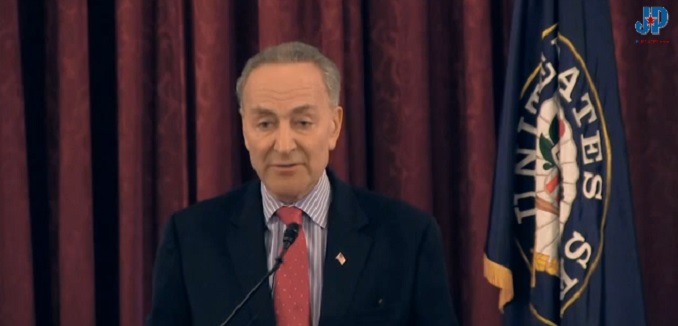Sen. Chuck Schumer (D-NY) declared over the weekend that “Congress is monitoring… to make sure the Iranian economy continues to decline” and that pressure on the Islamic republic had to be maintained, amid widening efforts in both the House and Senate to reassert a Congressional voice in Washington’s diplomacy with Iran.
In a brief interview after his remarks Schumer told The Jewish Week that the deal was a mistake. “I thought they shouldn’t have given in and reduced the sanctions,” he said. “But now, the view of the administration in Israel, the Netanyahu government and all of us is we have to see what happens with the negotiations. If they don’t come to much we’re going to tighten sanctions and do what it takes to prevent a nuclear Iran.
“We have a whole new proposal that we have on the table,” he said, referring to the Nuclear Weapon Free Iran Act, backed in the Senate by 12 Democrats and 12 Republicans and introduced earlier this year in response to the State Department-brokered deal, which some members of Congress say has no teeth.
Bipartisan groups from both chambers had in recent weeks sent letters to President Barack Obama outlining what they considered to be the minimum conditions for a comprehensive deal with Tehran, and emphasizing among other things that Iran must be forced to dismantle its nuclear infrastructure. The Islamic republic is obligated by roughly half a dozen United Nations Security Council resolutions to commit to such dismantlement.
Schumer’s comments – and broader efforts on the Hill – come as evidence continues to pile up that the interim Joint Plan of Action (JPA) has allowed Iran to begin to stabilizing its economy, generating worries that US negotiators may lack the leverage necessary to convince the Iranians to put their atomic program beyond use for weaponization.
Data released Tuesday by the state-run Korea National Oil Corporation documented a spike in South Korean imports of crude Iranian oil.
South Korea’s imports of Iranian crude oil in February more than doubled to 8.140 million barrels, or 290,714 b/d, compared with 3.974 million barrels a year earlier, data released Tuesday by state-run Korea National Oil Corp. showed.
Overwhelming majorities in Congress and across the American electorate have held that financial pressure should be maintained on Iran throughout negotiations, both to maintain short-term leverage and as a signal that walking away from the negotiating table will quickly trigger genuinely crippling sanctions.
[Photo: JP Updates / YouTube]




